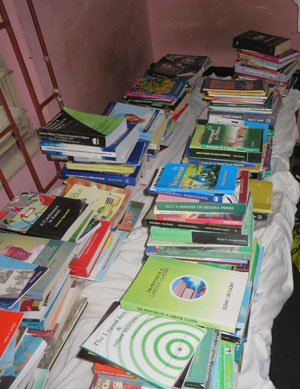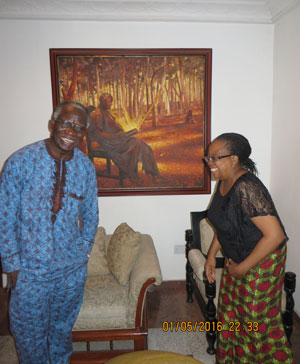Library acquisition trip to Lagos and Ibadan
23 April – 14 May 2016
By Gerard van de Bruinhorst, ASCL Library

Harvest of the first day.
"You like reading eh?" the Nigerian security officer asked me, with a mixture of irritation, amusement, and with a whiff of real interest. For the better part of an hour, I had thrown sand in the cogs of her security machinery, blocking the check-in and luggage-sealing queues in front of the KLM counter at the Murtala Muhammad Airport. I had been a witness for most of the afternoon to the searching of carefully folded Nigerian men’s underwear (blue and white striped boxer shorts are currently in vogue), packed in suitcases of all shapes and sizes. I had been warned about this way of manually searching hold luggage so I was happy that I had left all of my seven boxes filled with 150 kilos of books unsealed. I was less happy with the ban on trolleys after the first passport check. I had spent my last 500 Naira renting this trolley (first time ever in my 25 years of experience of air travelling that I had to rent a trolley in an airport), just to discover that I had to abandon it after 13 metres. I was even more unhappy when the security officer started to scan the titles of all the books, in a manner more reminiscent of people browsing in a bookshop than of civil servants looking for contraband or terrorist devices.
"No, not really, I just hate reading" I joked, a bit ruder than I had intended to. The last day of my three weeks in Nigeria had taken its toll. Just that morning, I had had to cop a 3000 euro loss just because the credit card payment machine at the DHL headquarters had been sent away for service. My three hours of negotiating for a 40% discount on a huge shipment of 160 kilos to the Netherlands had been for nothing. The only option left was the use of the African Studies Centre DHL account, which is a service of DHL Netherlands, and that comes with Dutch prices.

Ibadan campus. The structure between the cross
and the mosque was built to prevent the shadow
of the cross to fall on the mosque.
Apart from this rather disappointing (and expensive) end to the trip, my work had been exciting for most of my three weeks in Africa's most populous country. The daily papers I read constantly amazed me. The visits to more than fifty different book selling joints in Yorubaland (Lagos and Ibadan), to the 15th edition of the Nigeria international Book Fair on the University of Lagos premises, going to the conference on “Book, the Untapped Entertainment Treasure in Africa”, listening to the conversations of people discussing the daily news in front of newspaper stands, and even the 5-hour Pentecostal service “Power Must Change Hands,” together with 250.000 other churchgoers, were both interesting and exhilarating experiences.
With over a thousand books and journals (none of them available in any Dutch library, and approximately 300 titles not yet catalogued by any of the 10.000 Worldcat libraries), the ASCL library took another step in achieving one of its objectives to “promote the dissemination of knowledge and an understanding of African societies to the wider public sphere.”
Because the supply was so overwhelming, in the course of the journey I had to narrow the selection down to recent titles (2013-2016), in the core fields of politics, history, social sciences, and literature. Even so, it had become clear that the Nigerian publishing industry has also been hit hard as a result of the economic ‘melt down’ caused by the drop in oil prices. With barely 150 ‘new’ titles (2015-2016), production has slowed down significantly in the last two years.

Kolade and Tola Mosuro
Topping the list are publications on Nigerian politics, followed by literature and linguistics (the latter category is the result of a small exploratory investigation carried out on behalf of the University of Leiden Library). Because of the vast field of “emotion-packed stories of love, youthful exuberance, marriages, disappointments, betrayals, hardships, misery and death” as one publisher wrote on the cover, I had to be very selective. I had a selection made by Kolade Mosuro, founder and CEO of “The Booksellers,” and his wife Tola (librarian at the University of Ibadan).
As in a lot of African countries with a protestant mission history, the number of published (auto)biographies is astonishing. Restricting it to just over 10% turned out to be a real challenge. I was also surprised by the number of journals available: a trader offered me a list in print and on Excel with over 800 different titles of Nigerian serials.

Warning against cultism groups on Ibadan
campus.
With Stephen Ellis’ last book in mind (This present darkness: A history of Nigerian organized crime), I took special interest in publications about the darker side of Nigerian society. There are many books on violence ranging from domestic (“Genetic link to domestic violence: 2000 case studies”) to international (“Gulf war: Nigerian perspective”). Nearly half a century after the Biafra war has ended, the trickle of publications and memoirs hasn’t dried up yet. Books on camp cultism are also well represented.
Finally, it is necessary to mention the interreligious relations category in a Nigerian context. Apart from the (rare) academic work on religion in Nigeria, I bought a few religious publications on Christian-Muslim conflicts, which occasionally flare up in this country. I bought two rebuttals of Moshay’s pamphlet “Who is this Allah” (1990) which is seen by many Muslims and Christians to be quite unhelpful in promoting a peaceful co-existence. Moshay’s work has been analyzed by Falola in his book Violence in Nigeria : the crisis of religious politics and secular ideologies. Klaus Hock called the work in “Der Islam-Komplex” “die letzte Konsequenz [einer] fatalen Entwicklung,” (the final consequence in a deadly development). There is an interesting Dutch connection as well: Moshay’s book is only available in the original English and in a Dutch translation. Moreover the work is often (for example by Ayoola in “God on Trial”) mentioned together with F.J.L. Zeger’s very similar work “Is Allah God?”
Many ASCL fellows kindly offered their help to make this trip a success. Just to mention a few: Inge Ligtvoet, Akinyinka Akinyoade, Chibuike Uche, Femke van Zeijl, Ayobami Ojebode, Oka Obono and Xavier Moyet: thanks for your very helpful advice!

